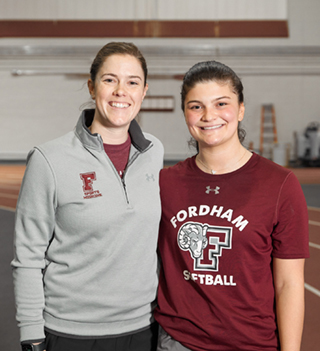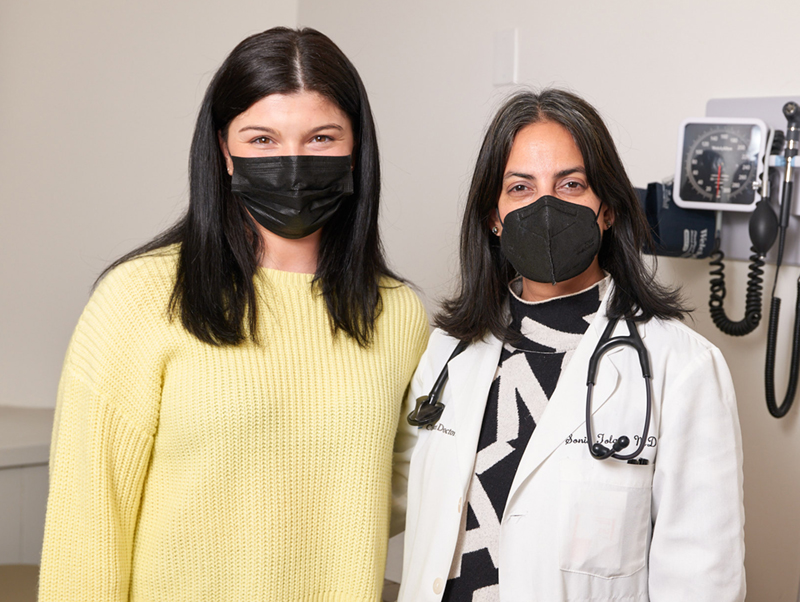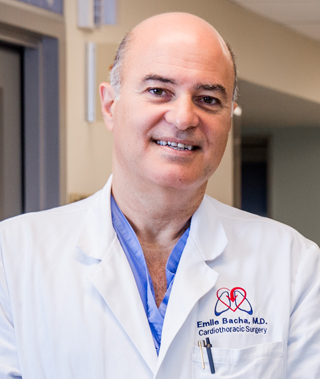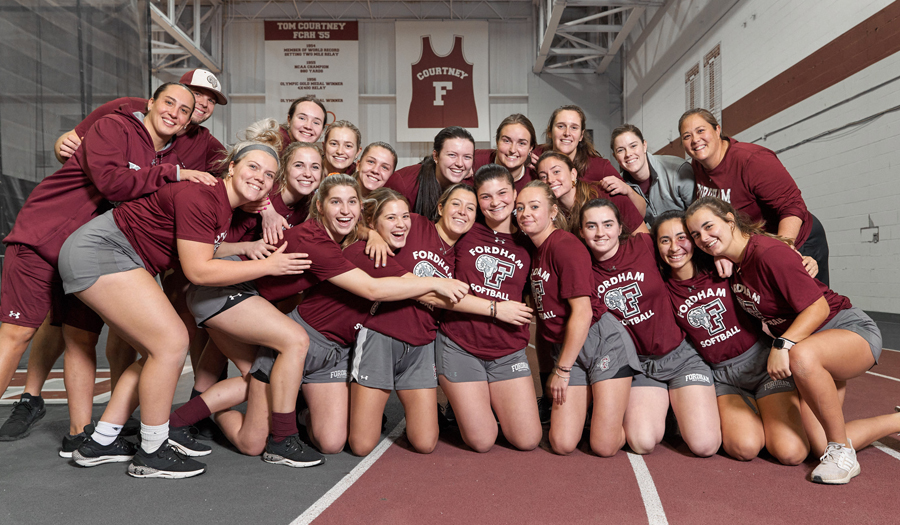‘I Am the Luckiest Girl in the World’
After college softball player Sarah Taffet suffered cardiac arrest during a game, doctors at NewYork-Presbyterian/Columbia discovered she had a rare heart condition and performed lifesaving surgery. Now, she is back playing the sport she loves.
Sarah Taffet, a 21-year-old softball player for the Fordham University Rams, was running out a routine ground ball during a tournament in Newark, New Jersey, last October when her opponent tagged her in the chest for the out.
What happened next was far from routine: She fell forward and hit the ground.
“I felt a little off, but thought I was OK,” remembers Sarah, who is from Cedar Grove, New Jersey. She was able to get up and jog toward the dugout. “Then everything started turning black and closing in on me.”
The college senior’s heart had stopped.
Coaches, parents, and healthcare professionals in attendance rushed to revive her with two rounds of CPR and an automated external defibrillator (AED) that her athletic trainer had brought to the game.

Sarah with her athletic trainer, Bridget Ward, who brought the defibrillator and used it to help revive Sarah when she went into cardiac arrest.
“I remember waking up thinking, ‘What is going on?’ I could see the panic in everyone’s eyes,” says Sarah.
She was discharged from a local hospital with few answers on what might have caused the cardiac event.
She resumed her senior year classes but needed medical clearance before returning to play with her Division I team, and was referred to the sports cardiology program at NewYork-Presbyterian/Columbia University Irving Medical Center.
“Our motto is ‘Leave no stone unturned,’” says her cardiologist, Dr. Sonia Tolani, co-director of the Women’s Heart Center at NewYork-Presbyterian/Columbia University Irving Medical Center and an assistant professor at Columbia University Vagelos College of Physicians and Surgeons.
“Dr. Tolani insisted on checking every single little box before making the final call,” Sarah says.
A coronary CT scan revealed what caused Sarah’s heart to stop: a rare congenital heart defect that makes it difficult for oxygenated blood to get to the heart, anomalous left coronary artery from the pulmonary artery, or ALCAPA, which occurs in one in 300,000 babies. Typically, it’s discovered in the first year of life, and of those diagnosed late in life, 90% do not survive.
Sarah needed open-heart surgery right away.

College softball player Sarah Taffet with her cardiologist, Dr. Sonia Tolani.
Defying the Odds
“I remember hearing the words ‘open-heart surgery’ and thinking, ‘What?’” says Sarah. “I thought this was a routine CT scan and that I would be cleared.”
An otherwise healthy student athlete, she had had no symptoms except for some chest tightness when exercising or running distances — which she brushed off as a normal byproduct of exertion. After all, she’d been playing softball since she was 5 without issue. Just before her cardiac arrest, she was weightlifting, sprinting, and practicing up to 20 hours a week during training.
Dr. Tolani’s experience treating athletes helped her recognize the problem. “It was unusual for someone who’s a non-endurance athlete to have a slightly reduced heart function and a slightly enlarged heart. That was the first tipoff that something wasn’t quite right,” says Dr. Tolani.
Amid the fear and uncertainty, Sarah focused on being grateful she was alive. “I could have died, and was so lucky the defibrillator was there,” she says. “And I’m so grateful to Dr. Tolani, who kept searching for the cause of what happened, and to the entire team at the hospital.”

Dr. Emile Bacha, who performed Sarah’s surgery.
On November 1, 2021, Sarah went in for surgery. She recalls being nervous, but encouraged by the confidence of her surgeon, Dr. Emile Bacha, chief of the Division of Cardiac, Thoracic, and Vascular Surgery at NewYork-Presbyterian/Columbia University Irving Medical Center.
“[ALCAPA] is almost like you have a car that’s supposed to have four wheels and one wheel is not attached, so it’s a very ineffective way for the heart to function,” says Dr. Bacha.
During the five-hour surgery, Dr. Bacha and his team detached Sarah’s left coronary artery from the pulmonary artery and stitched it into the correct position. The surgery was a success.
A Team Effort
When Sarah woke up after her surgery, her first phone call was to her teammates, who have been there for her every step of the way.
Sarah says her recovery was challenging, but she improved each day. Five-minute walks slowly became 15-minute sessions, building up to half an hour on the elliptical. Three months after the operation, her physicians cleared her to play, and February 1, 2022, marked her first day back at practice.
“I’m so excited and so happy to be able to play my senior season,” she says. “‘Thank you’ doesn’t even scratch the surface of what I would like to convey to my doctors for what they have done for me and my family.”
The sentiment is shared by Sarah’s parents, who are looking forward to seeing their daughter back on the field.
“Every step the hospital took was just fantastic,” says her father, Paul. “From the nurses to the doctors, to the front desk staff in the waiting room who made sure we were comfortable during Sarah’s surgery, everyone gave us everything we needed.”

Sarah with her softball team, the Fordham Rams, during her first week back at practice.
“What’s more important is how comfortable Sarah is with the hospital,” adds her mother, Maria. “She knows she has a team there and she’s in good hands, and that has given her the confidence to move forward.”
“Taking care of athletes is a team effort,” Dr. Tolani says.
Sarah is grateful for her second chance at life, and has an even deeper appreciation for the sport she’s always loved, even getting up at 5 a.m. to catch a flight to an away game. “I missed being on the field or even at team practices or meetings, and it really showed me how special playing a sport is and the people you meet,” she says. With Sarah back in the lineup, the Rams won the Atlantic 10 Conference championship and made it to the NCAA Regionals — a season she calls “extra special.” In May 2022, she graduated from Fordham University and plans to return in the fall for her master’s degree in media management.
Says Sarah, “I am the luckiest girl in the world.”
Additional Resources
Learn more about heart health at NewYork-Presbyterian.

